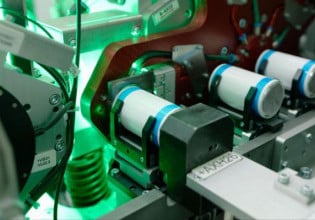batteryuniversity.eu Offers UN Transport Tests for Lithium Ion Batteries Including All Certifications
Manufacturers and suppliers of lithium ion cells and batteries can have their products thoroughly tested in a new state-of-the-art test laboratory in Karlstein (Germany), which the batteryuniversity.eu with the support of BMZ Batterien-Montage-Zentrum has put into operation. In the laboratory, which is among the most advanced of its type in Europe, cells at 0 to 5V with up to 10/120 A as well as batteries at 0 to 60V with up to 200A or to 12kW can be tested. Furthermore, the batteryuniversity.eu offers complete UN Transport Tests including specialist support in the event that a redesign of the battery packs is necessary with the issuance of expert reports and certificates required for the transport of lithium ion cells or batteries.
According to Sven Bauer, founder of batteryuniversity.eu and managing director of BMZ, it was decided to take this step, not least because of the significantly more stringent transport regulations for lithium ion cells and batteries that came into effect from January 1, 2009. Despite the well-known risks during transport and storage of lithium batteries, some manufacturers, suppliers and transport companies still consciously or unknowingly ignore the regulations. Sven Bauer considers this to be highly dangerous. "Lithium in powder or dust form can self ignite at around 20°C room temperature. Lithium as a solid material ignites in the air when the melting point of 179°C is reached; however, once this point is reached a metallic fire that can not be extinguished develops quickly with temperatures in excess of 2000°C."
Sven Bauer adds that lithium also reacts intensively in contact with water. It does not sink, but rather floats on the water surface. This forms a highly inflammable hydrogen gas and highly caustic lithium hydroxide. Explosions in closed rooms could occur by ignition of the hydrogen. Furthermore, the water dissolves lithium hydroxide and takes on its caustic characteristics. "In addition to due caution in handling of this material, the only protection against these undesired effects are extensive test procedures, in which all possible transport risks are simulated in advance in the laboratory," commented Sven Bauer.
Since 2003, all lithium cells and batteries, independent of the system and lithium content, must be tested according to special, mandatory safety standards. The accumulators may absolutely not be placed on the market without qualified proof of these tests.
Since the beginning of last year, numerous new regulations for the transport of lithium-based cells and batteries have to be observed. Not only that lithium cells and batteries are now generally classified as "Class 9 Hazardous Materials" (dangerous goods), but also the regulations for registration, packaging, labeling, handling and accompanying documents have to some extent changed significantly. For example, a distinction is now drawn between lithium ion and lithium metal batteries/cells. A decisive factor is also how and in what the respective cell or battery has been packed.
The complexity of the whole issue is shown by the fact that a total of six new UN shipping names with new numbers have been assigned for it: UN 3480 Lithium ion batteries (including lithium polymer batteries), UN 3481 Lithium ion batteries packed with equipment, UN 3481 Lithium ion batteries contained in equipment, UN 3090 Lithium metal batteries (including lithium alloy batteries), UN 3091 Lithium metal batteries packed with equipment and UN 3091 Lithium metal batteries contained in equipment.
General requirement for the approval of lithium cells and/or batteries for transport is, however, always proof of successful tests in accordance with the United Nations "Recommendations on the Transport of Dangerous Goods Manual of Test and Criteria" Part III, subsection 38.3. It is irrelevant whether possible exemptions can be exercised or the cells/batteries are classified as Class 9, and hence must adhere to the hazardous materials regulations in their entirety.
batteryuniversity.eu with the support of BMZ have so far invested around €1.2 million in personnel and laboratory equipment in order to be able to fully perform all necessary UN Transport Tests for lithium cells and batteries. This investment would hardly ever pay off for companies that are not exclusively involved with the manufacture or assembly of battery packs. In addition, according to Sven Bauer; most of the persons concerned lack the necessary detailed technical knowledge for such tests. It is necessary to have many years of practical experience with different lithium ion technologies in order to assess the safety of battery packs. What happens when this knowledge is missing has been shown in a series of experimental test with third-party products.
"More than 10% of the tested batteries did not conform to the current legal safety requirements. We are not only talking here about a fine of up to 50,000 Euros, which could be imposed if regulations are violated. In the event of damage, the responsible persons must also expect that they will be held accountable for substantial destruction of property, severe injury to any person or even, in the worst case, death." Ultimately, for those not wanting to take this potential existence-threatening risk, there is no other alternative to the statutory complex test procedures." commented Sven Bauer.






